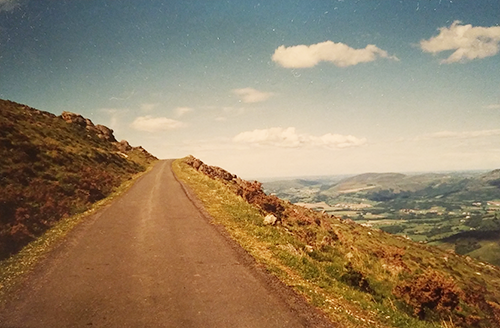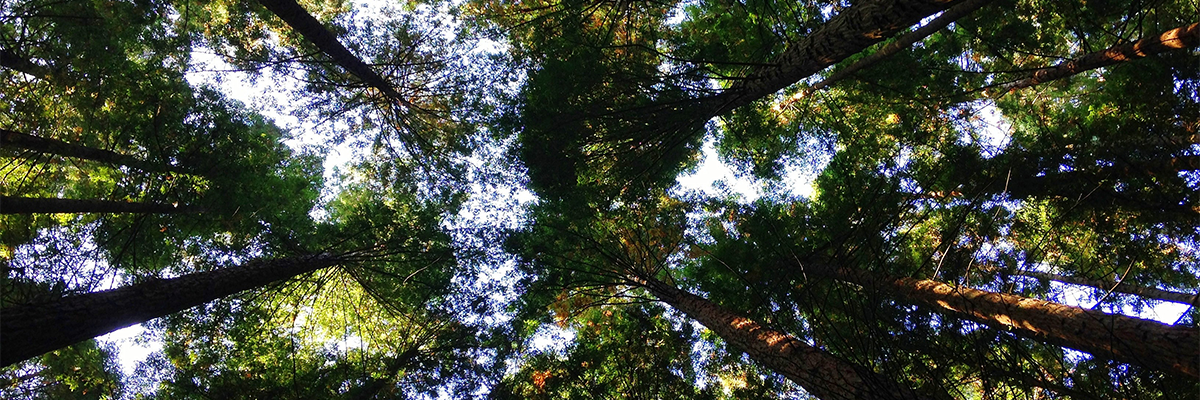Richard Carter has been a reference librarian at the St. Mike’s John M. Kelly Library since 2004. He grew up in Ottawa and loves walking, reading, helping students, and being a dad.
On Walks, Good Books, and Libraries

What is it cruising past you with an annoying motorized purr, unzipping from behind your ear the entire afternoon? A bee, I’ll wager.
Sometimes, it swerves to a mapped azalea preening by a hedgerow; sometimes it weaves in complicated ever-widening arcs, scenting pollen; other times, aflush, it hovers in such a tizzy over a satellite dish of petals that it hardly knows what to do except keep buzzing. Finally, it settles on a stamen. Then lifts a moment later to an adjacent splash of colour.
Nothing is forced. The bee has simply burst out of the hive into a bright world to explore widely, up close. It is how I have always thought walking, reading, and thinking should be—and research too: unhurried, whimsical, open-minded, observant.
*
Laurie Lee was an English writer best known for his autobiography Cider with Rosie, but it was the enraptured prose of his sequel—in which he hiked across Spain on foot—that sent me tramping. Laurie Lee went to Spain and walked for months; I set out on a three-day ramble outside Ottawa. It was not very exciting, but it was, at the same time, marvellous. I camped in backyards; I passed bristling cornfields; I busted a tentpole in a thunderstorm; I crossed the 417 highway and felt the contemptuous delight of youth. I lived on apples, water, bread, beans, and cheese. Then I walked home.
Three years later, I met Lee by chance at a village cricket match in Gloucestershire. In a lawn chair, under a broad-brimmed sun-hat, he leaned forward with a kindly grin. He was wise-cracking and curious and full of questions. I told him I liked the rhythm of his sentences. “I try,” he quipped. Then he asked me where “my people” were from.
“Well,” I said, “my grandmother is from Wales.”
“Wales?” He said, surprised. He looked me over. “You look more like a Viking to me—you’ve a lot to answer for!”
Not long before, in London, I’d bought a gigantic map of Spain—one of those maps so detailed you can flatten it out on the floor, and when you kneel up close you sense you could fall right into it. Soon after, I grabbed a backpack and tent and jumped on a ferry to Spain.
*
What happens when you walk or read? You enter something else. Part of what you enter is your thoughts, because you are the only subject of your life, the one who does the reading and the walking, but soon you get the feeling that, when you walk, you are walking through something both within and beyond yourself; and that when you read, you are encountering something outside your experience and knowledge: you are lost in the happiest way a human being can be lost.
In the woods, Nature takes you in. Your only job is to step gamely forward, deeply breathe, and look. And the only place I can think of at all akin to the woods is a library.
My first memory of a library was a book of Greek mythology. Lanky, dog-eared, bandaged with tape, it snoozed with several others at the bottom of an elementary school bookshelf. Cracked open, the book featured full-sized, vivid, colour prints, and an incense-like smell. An image of Persephone haunted me most—happily skipping through a meadow one moment, then falling through a crack down to Hades the next. I fell with her and feared and hated the Underworld; but in falling I also felt empathy for Demeter, her mother, who wandered the surface, agitated with grief.
With any good book you plunge like Persephone headlong into the unknown, and it is being held there awhile, braced against a wild experience or a multi-faceted thought, that you equip yourself to shoulder your pack and strike back to the surface.
In the 1990s, as an undergraduate, I began to realize I was doomed to work in a library. Back then I shelved books at the Carleton University MacOdrum Library. I loved the rows and rows of stacks; they were like a forest. Vast ranges fanned out everywhere, crammed with craggy print titles, oversized behemoths, and musty bound journals. You could pick a book up, and put it down; crouch down low and inspect another, flipping through acid-browned pages; tug the spine of a new one back so it fell in your palm like fruit. I loved the breadth of the Library of Congress classification system; the microfilm reels; the close-packed sheafs of microfiche; and the kingdom of government documents that followed a mysterious order called CODOC.
I got to know and love every floor: the grim black volumes of Sociological Abstracts, the tidy narrow issues of Foreign Policy, the crumbling Canadian Geological Survey; the Statesman’s Yearbook, House of Commons Debates, the Reader’s Guide to Literature. I knew where to find T.S. Eliot criticism, or music scores, almost instinctively: the books themselves were like the bark of trees, shrubs, or the plumage of a birds.
In the wild, you sense a space that sprawls around you; in a library, you sense that too, but vertically. Just as a creaking sequoia hints of an age beyond your own, a library is silent but constantly achatter: past and present voices interweave in a living throng of thoughts, disputes, and stories.
At the John M. Kelly Library, I still roam bookshelf ranges whenever I can. But much more often I forage in catalogues, ebooks, websites, and databases. Together, students and I swat virtual branches, wade through virtual swamps, and sometimes feel lucky after a rocky climb to glimpse a virtual view.
*
Thinking seems to me best undertaken with idleness, so that the mind can adjust to off-putting ideas, implications, connections, and consequences. Idleness, yes, and boredom: I don’t mean the lazy type but the patient kind—an appreciation of slowness as soil for understanding. Yet students are pushed to consume vast wads of text and other media; profs must sweat to publish enough to meet their tenure requirements.
New shoots in the wild feel no such pressure: they unfurl when they are ready, and why is the world any worse off for the wait?
Your blood right now is bustling through your body, drumming an urgent unrepentant metaphor for life. Wherever you are—in thought, in book, on foot—a forest stands and threatens with its welcome: birds call, squirrels start or scuttle, oak or book spines creak or crack, and the footpath meanders into mystery. I believe it, even at home, with COVID prowling the streets, and spring unzipping campus with relief in every leaf.
Read other InsightOut posts.

